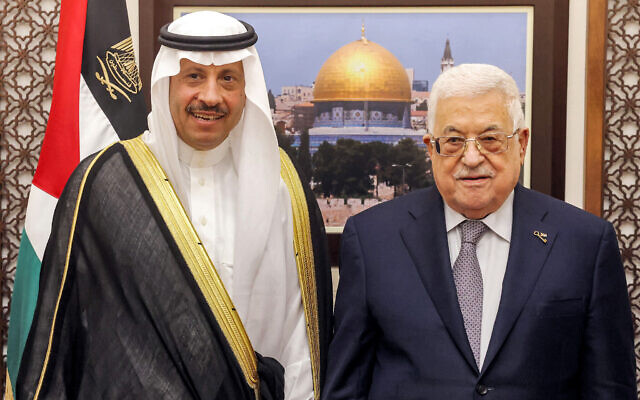Prime Minister Benjamin Netanyahu reportedly told US President Joe Biden during their meeting last week that he is prepared to take steps that would keep the possibility of an Israeli-Palestinian peace agreement alive as part of the normalization agreement that Washington is trying to broker between Israel and Saudi Arabia.
Netanyahu has said publicly since the New York meeting that the Palestinians should be part of the US-Israel-Saudi agreement but that they should not have a veto over it. A willingness to extend that Palestinian element to steps relating to a future peace deal between Israel and the Palestinians — as vague as that might be — is not something he has acknowledged publicly.
According to a Thursday report in the Walla news site, Netanyahu’s aides met with senior White House officials Brett McGurk and Amos Hochstein the night before the prime minister’s meeting with Biden on the sidelines of the UN General Assembly. During that preparatory meeting, the US officials asked their Israeli counterparts what concessions to the Palestinians Netanyahu would be prepared to offer Biden during their sit-down.
The Netanyahu aides declined to get into specifics, telling McGurk and Hochstein that the prime minister would discuss the matter during the one-on-one portion of the meeting with Biden the next day.
The Palestinian component of the Saudi deal took up a significant portion of the meeting Biden and Netanyahu held with their staffs on September 20, Walla said, citing a senior Israeli official and a source familiar with the matter.
Get The Times of Israel's Daily Edition by email and never miss our top stories
Biden did not give a list of specific concessions he would like Netanyahu to make but he did say that he wants Israel to take steps that will preserve the possibility of a two-state solution.

This handout picture provided by the Palestinian Authority’s press office (PPO) shows PA President Mahmoud Abbas (R) receiving the credentials of Saudi Arabia’s Ambassador to Palestine Nayef al-Sudairi, at the former’s office in the West Bank city of Ramallah, on September 26, 2023. (Thaer Ghanaim/PPO/AFP)
Netanyahu replied by offering a general agreement to take steps that would leave the door open to a future peace agreement with the Palestinians, Walla said.
For roughly a decade, Netanyahu has refrained from expressing support for two states, instead saying he would only accept “limited sovereignty” for the Palestinians with Israel maintaining security control over the West Bank.
Constrained by far-right coalition partners who oppose steps toward Palestinian statehood, Netanyahu is aiming to limit talk of gestures for Ramallah to economic aid for the cash-strapped Palestinian Authority, an official familiar with the matter told The Times of Israel last week.
This would likely be insufficient for Saudi Arabia, which views itself as a leader of the Arab and Muslim worlds and cannot be seen as neglecting the Palestinian cause in exchange for normalizing ties with Israel.
The Biden administration continues to tout the importance of a two-state solution, and those involved in the talks have recognized that the deal being negotiated with Riyadh may be the last opportunity to salvage that framework. They also recognize that it will be needed in order to convince enough progressive Democrats to back the initiative, which will likely include a major defense pact with Saudi Arabia — a country with a checkered human rights record.
The Palestinian Authority has presented a list of potential steps it would like to see taken in the context of the normalization talks to Washington and Riyadh, but those are still being studied by both sides.
The White House is aiming to wrap up negotiations by the end of the year, according to Israeli and US officials. Because the deal will likely include Saudi and Israeli demands for defense pacts with the US, those will then have to be submitted to the Senate and receive the backing of two-thirds of the body — an uphill battle that will likely extend until next spring.


